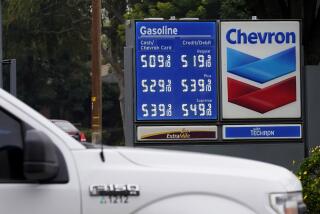Unocal, FTC Settle Over Premium Gas Claims : Consumers: Agency says there is no evidence of higher performance. Company admits no wrongdoing, but will write customers.
- Share via
In a dispute that strikes at the heart of how gasoline is sold in the United States, Unocal Corp. and its advertising agency on Thursday settled Federal Trade Commission charges that they made unsubstantiated performance claims for Unocal’s high-octane fuels.
According to the FTC complaint, Los Angeles-based Unocal lacked adequate scientific evidence for its claim that its 89 and 92 octane gasolines increased engine performance and longevity.
Without admitting wrongdoing, Unocal agreed to write to its credit card customers in five states, including California, telling them that most cars do not need high-octane gasoline to perform correctly and urging them to check their owner’s manuals for the recommended fuel.
Studies by the American Automobile Assn., Public Citizen and other consumer groups indicate that most cars run well on 87 octane regular unleaded. But Americans--spurred by the massive marketing efforts of oil companies--persist in buying higher-grade gas.
“Many consumers are tempted to buy higher-octane gasoline for their car, and they somehow equate it with increased performance. That’s not what octane does,” said Sue L. Frauens, acting regional director in the FTC’s Los Angeles office.
Engine knock, or “ping,” is the only condition improved by switching to a higher-octane fuel, according to the FTC.
A study released in January by the Institute of Transportation Studies at University of California, Davis, estimated that U.S. drivers who switched to premium between 1983 and 1989 are spending an unnecessary $3 billion more a year for their gas.
As for individual car owners, a AAA study found that consumers could save $110 a year by switching from high octane--which averages 17 cents a gallon more--to regular unleaded.
By the late 1980s, premium use had jumped to about 30% of all gasoline sold, according to most estimates, but with the price hikes that accompanied the Gulf War, drivers have been returning to regular.
“They haven’t waited for the FTC,” retail gasoline analyst Trilby Lundberg said.
Premium unleaded now makes up 20% of the market, according to the U.S. Department of Energy. But the FTC and others estimate that no more than 10% of all cars on the road need higher-octane fuel. The American Petroleum Institute says that 14% do, with another 7% requiring premium grades on an occasional basis.
In settling with the FTC, Unocal and its agency agreed that, lacking better scientific evidence, they will stop making claims that drivers could get better performance by exceeding auto manufacturers’ recommendations for fuel use. Unocal stock added 12.5 cents to close at $27.375 on the New York Stock Exchange.
In one Unocal television ad cited by the FTC, Unocal described its 92 octane premium as “the highest-level octane gasoline you can buy to help your car run better, longer.” The ads ran in 1991 and 1992.
“We don’t know that our advertising made people shift upwards without a need for it,” Unocal spokesman Barry Lane said. “I think people buy the gasoline that they feel is right for their car.”
But consumer groups and the FTC contend that consumers are in no position to judge.
“A large percentage of people believe that higher-octane gasoline necessarily improves an engine’s performance, and this advertising really plays into that,” said Joel Winston of the FTC’s division of advertising practices.
The UC Davis study found that only 17% of drivers switch to premium because their engines are actually knocking.
Although the FTC has secured similar agreements over octane claims, this is the first time the commission has pressed its case against the ad agency involved, Chicago-based Leo Burnett Co.
“The facts substantiated that (Burnett) knew or should have known that the claims were unsubstantiated by reliable and competent scientific evidence,” Frauens said. A Burnett spokeswoman, Lisa Lagger, said the firm signed the settlement “to avoid costly and disruptive litigation.”
What Grade of Gas Do You Need? Consumer and automotive experts--and now the Federal Trade Commission--say most cars can operate well on low-cost regular unleaded gasoline--the kind with an 87 rating for octane. Here’s how the FTC says to decide the octane rating your vehicle requires.
* Follow the advice in the owner’s manual. Some luxury cars or cars with high-performance engines need higher-octane gas.
* Generally, use the lowest octane gas that lets you operate the car without engine “knock” or “ping.”
* If knock or ping develops during periods of high temperatures or low humidity--or when you drive the vehicle at high altitudes--consider a temporary switch to higher-octane fuel.
* With some engines, the octane requirement may gradually rise as the vehicle ages.
* Knock or ping can sometimes be eliminated with a tuneup. If it persists, try higher-octane gas.
Source: Federal Trade Commission
More to Read
Inside the business of entertainment
The Wide Shot brings you news, analysis and insights on everything from streaming wars to production — and what it all means for the future.
You may occasionally receive promotional content from the Los Angeles Times.










